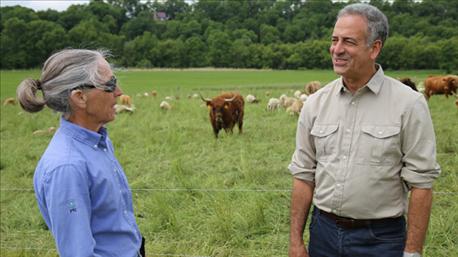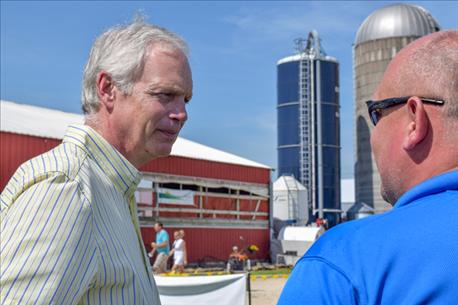
Wisconsin's U.S. Senate election on Nov. 8 features incumbent Sen. Ron Johnson, a Republican, and his Democratic rival, Russ Feingold. Feingold served as senator for 18 years before Johnson defeated him in 2010. Wisconsin Agriculturist asked both candidates questions relating to issues that affect state farmers. Following are their responses:
Question: What are your plans for the next six years to promote the economic strength of agriculture in Wisconsin?

U.S. SENATE RACE: Ron Johnson and Russ Feingold have diverse views on agriculture.
Feingold: Farmers are the economic engine of rural Wisconsin. Unfortunately, low prices for virtually all commodities over the past two years mean that we must act now to shore up our rural safety net. This includes removing some of our record cheese stocks, and replenishing USDA loan programs that have run dry and left farmers waiting for credit when they need it most. My opponent voted against the current version of the rural safety net, and has taken no actions to address these current needs. In fact, while a bipartisan group of over 60 members of Congress sought USDA action to support dairy farmers this summer, Sen. Johnson’s name was conspicuously absent.
Johnson: While we work towards fairer prices, I will focus on providing opportunities to farmers and other rural entrepreneurs. I will work to help farmers with credit, with selling goods directly to consumers and with processing food locally. I will also work to promote risk management tools to weather natural disasters, and voluntary conservation programs to share the costs of being good stewards of the land.

IMMIGRATION REFORM: Former Sen. Russ Feingold, D-Wis., (right) says "Congress must finally put partisan politics aside and pass a comprehensive immigration package that provides a path to citizenship, secures our border, treats people with dignity and creates a more rational system for future immigration. Doing so will help our communities and grow our economy."
Finally, I will work to invest in our traditional and digital infrastructure in rural areas. After all, in order for people to do their jobs, they need roads that work and broadband internet connections that are affordable.
We need to get Washington out of the way of stronger economic growth. That means scrapping our broken tax code, getting rid of burdensome regulations, and making it easier and cheaper for farmers to get their products to market. This will help farmers keep more of their hard-earned money. That money would be better spent on their families and growing their business.

ELIMINATE TRADE BARRIERS: Sen. Ron Johnson, R-Wis., (right) says he will "knock down trade barriers so farmers can ship their food around the world while ensuring farmers are treated fairly in trade negotiations.
Specifically, we need to ensure that the EPA does not implement its proposed Waters of the United States rule. WOTUS would allow Washington bureaucrats to regulate small ponds, ditches, and creeks on private property, affecting 92% of the land in Wisconsin and driving up costs and killing jobs due to added government regulation. I support delisting the gray wolf from the endangered species list to better protect farmers and their livestock. Additionally, we should knock down trade barriers, so farmers can ship their food around the world while ensuring farmers are treated fairly in trade negotiations.
Question: Would you do anything to strengthen immigration laws?
Feingold: As I travel across Wisconsin, I hear from our state’s businesses and farmers all the time: Congress must finally put partisan politics aside and pass a comprehensive immigration package that provides a path to citizenship, secures our border, treats people with dignity, and creates a more rational system for future immigration. Doing so will help our communities and grow our economy.
Solving this problem requires bipartisanship and political courage, not partisan game-playing.
My opponent, however, has aligned himself with Donald Trump’s scare tactics and dehumanization of immigrants. It is appalling for someone from a nation of immigrants to attack new immigrants, the vast majority of whom simply seek a better life. It also misses the practical reality of how critical immigrants are for Wisconsin’s farms. Without this labor force, cows wouldn’t get milked, crops wouldn’t get harvested, and the U.S. could shift from exporting food to importing it just to feed ourselves.
Johnson: We need to secure the border and fix our legal immigration system. As chairman of the Senate Homeland Security and Governmental Affairs Committee, border security is one of my top priorities. We need to strengthen our border to keep our enemies and drugs out of the country and protect local communities. At the same time, we need to fix our legal immigration system by reforming the H2A agriculture visa that would better serve the 40% of Wisconsin dairy workers who are immigrants. Guest workers are crucial to the success of our farmers, and they provide a reliable stream of labor. The federal government shouldn’t stand in the way of farmers getting access to the labor they need.
Question: What is agriculture’s future role in the renewable energy industry? Would you like to see the ethanol blend in gasoline sold in Wisconsin higher than 10%?
Feingold: Ethanol and other biofuel technologies are an important part of our renewable energy future. I was pleased to see the USDA support investments in ethanol fueling infrastructure, which will allow more Americans to power their cars with higher ethanol blends such as E15 and E85, and which will grow the industry as a whole. This program was more than just a federal subsidy, as it leveraged the federal investment with state and private funds to make a larger and more effective program. I believe we should encourage these sorts of investments, while at the same time continuing to support research into new bioenergy technologies.
In addition to supporting infrastructure and research, we should also make common-sense regulatory reforms to encourage the adoption of biofuels. For instance, we should raise the Reid Vapor Pressure exemption, currently available for E10 to E15 as well. Doing so will allow retailers to sell E15 in the summer.
Johnson: I always look at these issues with the goal of doing no economic harm. Farmers and ethanol producers have planned and built business models around existing conditions, and it would be unfair to them for unexpected or unanticipated changes to be imposed on them as a result of government action. The question of ethanol content is one best settled by the mutual needs of customers and fuel producers through the free market.
Question: Do you believe the dairy Margin Protection Program, the farm-level safety net, is doing an adequate job to protect farmers from low milk prices? Why or why not?
Feingold: The Margin Protection Program does not currently provide an adequate safety net for dairy farmers in times like these. There are changes we can make to the current program, for instance, by better calculating the cost of feed for farmers here in Wisconsin. But the fundamental problem stems from the 2014 Farm Bill. Instead of determining what dairy farmers needed for an effective safety net, congressional leaders preordained that tens of billions of dollars would be cut from nutrition and agriculture. An effective dairy safety net was a casualty of this approach.
Sen. Johnson has done nothing productive during the debate over this important issue. Instead of making any meaningful efforts to improve the safety net for dairy farmers, my opponent has focused on an ideological attempt to break the urban-rural coalition that makes the farm bill possible.
Johnson: The program is so new that an adequate evaluation of its results is premature, especially given changes in market conditions since 2014. Its intentions may be good, but too many government programs carry serious negative unintended consequences for us to believe any program can go on without improvement. I continue to monitor this program to make sure it’s having the right effect on our hard-working farmers in Wisconsin.
Question: Why is Wisconsin agriculture important to you?
Feingold: Farming is about more than our state’s economy. Food and agriculture are a part of our shared culture. From the cherries of Door County to the cranberries of central and northern Wisconsin, from the vegetables in the Central Sands to the ginseng in Marathon County, from Organic Valley in Vernon County to the dairies and cheese plants throughout our state, I know the diversity, the importance and the needs of Wisconsin farmers. If elected to the U.S. Senate, I will honor the work and the values of the farmers and people of rural Wisconsin.
Johnson: I grew up working on a farm, and it instilled in me a sense of hard work and appreciation for the men and women who grow and produce the food we eat. Wisconsin has a strong heritage of agriculture, and as I travel around the state talking with farmers, I see the challenges that they face, but also the possibilities to build a stronger economy.
After spending my career building a business in the private sector, I understand just how important economic growth is to Wisconsin — and our farmers and agriculture industry are a crucial part of that. I know what it takes to create jobs and more opportunity, and I’m committed to getting Washington out of the way and helping Wisconsin farmers grow their business.
About the Author(s)
You May Also Like






